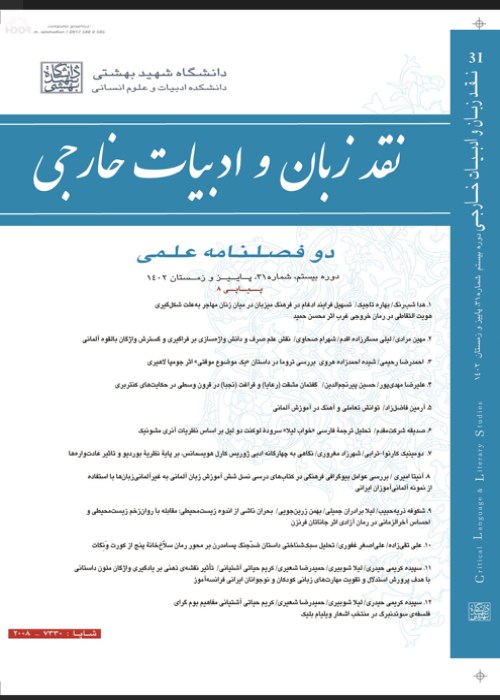Foreign language policy and planning specifications of Iran based on Hornberger’s integrative framework
Author(s):
Article Type:
Research/Original Article (دارای رتبه معتبر)
Abstract:
Introduction
Foreign languages are taught and learned worldwide today, but with great differences in intensity, levels of education, motivations, goals, and teaching methods. However, the reason for the worldwide quantitative or even qualitative development of languages in any country is not the result of a random principle. Any language that is to be learned and introduced in a foreign country inevitably needs a corresponding language planning against the background of the language policy of the respective country (Krumm, 2003: 35). Especially because foreign languages are offered to both Iranian schools and universities, the question arises: What is the purpose of foreign languages in the practice of the Iranian higher education landscape? Which, in turn, raises the question of what language policy concepts exist for teaching foreign Languages in Iran.1
Background Study
This paper presents a brief introduction to the approaches and frameworks in recent research in Language policy and planning. In the 1990s, a review of books and articles on Language policy and planning was carried out, many of which have demanded and suggesting new theoretical paths in this direction. Cooper (1989) and Tolefson (1991) are among the pioneers of this field. Even before, Haugen (1983, p. 276) suggested that an explanatory theory of language planning should definitely be determined by a single theory or model for judgment. Nowadays, after studying many of the available papers, one can find the balance between the theories and the proposed practical methods. The Integrative Framework Language policy and planning created in the early 1990s (Hornberger, 2006, p. 28) in the paper Frameworks and Models in LPP, is a framework for defining objectives and language options as well as its various applications. Policies and language planning are very diverse, which Hornberger provided to explore and combine them in an Integrative framework. She portrays language framework policy and planning goals as an Integrative framework.
Methodology and argument
The situation of foreign languages in Iran was illustrated by Hornberger’s integrative framework. In the present work, the basis of the comparison is laid down between differently used language policy in Hornberger’s framework and Iran. The aim of this work is to provide an overview of language policy and language planning in Iran, to describe their use or use in the structure of language in different areas of society, and to show their intentions, and to compare these various language policy decisions with documentary research. Based on this, it will be determined in the course of the work whether and to what extent Iran’s language planning is to be assigned to the Hornberger framework. In this context, the following main and research question arises: Does a coherent overall concept of language policy and planning exist in relation to foreign languages in Iran? It is hypothesized that there is a coherent overall approach to language policy and planning in relation to the foreign languages that are appointed in Iran. In order to answer these questions, the current position of foreign languages in Iran in the academic and academic field is determined.
Conclusion
As the study has shown, based on comparison with Hornberger’s integrative framework, there are no obvious plans, targeted uses and targeted language users for imported foreign languages in Iranian society. Although Iranian foreign language policy and planning has shown no logical and convincing concept, the added value of the present work lies primarily in the fact that a study was carried out on the various state documents and parallelized in an integrative framework, as well as the gaps in Iran’s language policy measures have been found.Keywords:
Language:
Persian
Published:
Critical Language & Literary Studies, Volume:16 Issue: 22, 2019
Pages:
37 to 58
magiran.com/p2008847
دانلود و مطالعه متن این مقاله با یکی از روشهای زیر امکان پذیر است:
اشتراک شخصی
با عضویت و پرداخت آنلاین حق اشتراک یکساله به مبلغ 1,390,000ريال میتوانید 70 عنوان مطلب دانلود کنید!
اشتراک سازمانی
به کتابخانه دانشگاه یا محل کار خود پیشنهاد کنید تا اشتراک سازمانی این پایگاه را برای دسترسی نامحدود همه کاربران به متن مطالب تهیه نمایند!
توجه!
- حق عضویت دریافتی صرف حمایت از نشریات عضو و نگهداری، تکمیل و توسعه مگیران میشود.
- پرداخت حق اشتراک و دانلود مقالات اجازه بازنشر آن در سایر رسانههای چاپی و دیجیتال را به کاربر نمیدهد.
In order to view content subscription is required
Personal subscription
Subscribe magiran.com for 70 € euros via PayPal and download 70 articles during a year.
Organization subscription
Please contact us to subscribe your university or library for unlimited access!


